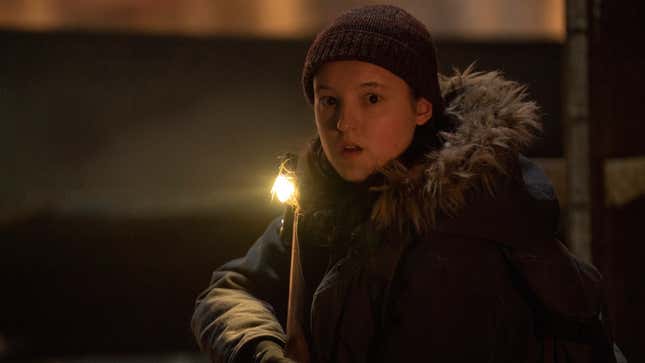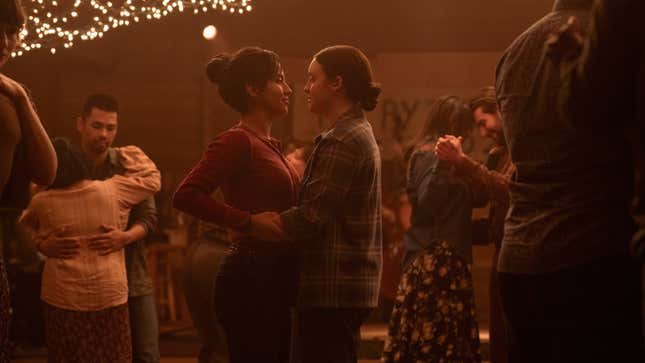
Yesterday, the second season of HBO’s The Last of Us premiered, and I had my gripes with this first episode. HBO’s approach to The Last of Us Part II’s story has stripped away a lot of the mystery and tension present in the game, but I do want to give some props to the team behind the show for faithfully recreating one of the best moments in Naughty Dog’s post-apocalyptic drama, even if it showed up much earlier than fans were probably expecting.

“Future Days,” the first episode of season two, takes place almost entirely in the Jackson settlement that Joel (Pedro Pascal) and Ellie (Bella Ramsey) have been living in for the past five years. The two have found places in the community of survivors protected from the infected horde, though Ellie is clearly jaded toward the notion of working with others for a larger purpose. To her, all these town walls do is keep her from reaching her true potential as someone who can fight against the infected, and she cares little for most of the civilians in this town. The one person she does seem to care about is Dina, played by Isabela Merced in the show. The two girls are best friends, and it’s clear that Ellie harbors some feelings for Dina, and every now and then, she gets a sense that it might not be one-sided.
Years of romantic tension between the two bubbles over at a dance in Jackson. Ellie is a wallflower, while Dina is the life of the party, dancing to Crooked Still’s “Little Sadie” and putting on a show. Then things start to slow down as the folk group’s melancholy, religious ballad “Ecstasy” begins to play. Dina drags a hesitant Ellie to the dance floor, and they begin to slow dance.
I wasn’t expecting to see this scene recreated in the show this early, as this moment originally appears as a flashback in the final hours of The Last of Us Part II. But before the game launched in 2020, the dance was one of the first scenes we ever saw, being featured at an E3 presentation way back in 2018. Even before I met Dina when I finally played the game two years later, I was already captivated by her effect on Ellie. This was an older version of the girl we’d met in the original game, and it was clear that everything she’d been through had left her more world-weary, perhaps aging her as much as the passage of time itself. Dina, meanwhile, was downright chipper, comparatively. She is playful where Ellie is always on guard, and she brings out those sparks of passion and excitement in Ellie that seemed to have been drained from her.
This moment on the dance floor is one of the best snapshots of the two’s dynamic, and I was frankly terrified that it would fall victim to the show’s inferior writing style. As I’ve laid out in my review of season two and recap of the first episode, I can’t stand the show’s tendency to overexplain and justify every action and thought these characters have. It gets downright painful for me to watch in some episodes, but I was pleasantly surprised to see that the show kept this exchange almost exactly as it was in the PlayStation 4 game.
Ellie: Every guy in this room is staring at you right now.
Dina: Maybe they’re staring at you.
Ellie: They’re not.
Dina: Maybe they’re jealous of you?
Ellie: No reason to be. I’m not a threat.
Dina: Oh, Ellie. I think they should be terrified of you.
Then Dina kisses Ellie in the middle of the dance floor. Sure, I might not like the way the show’s actors deliver these lines as much I love the way they’re said in the game, but even so, the back and forth does such an excellent job of illustrating Ellie’s beaten-down self-esteem. She doesn’t think Dina could ever view her this way, even though they are leaving no room for Jesus as they sway back and forth together. Dina, meanwhile, tells Ellie that she is so much more than she realizes, even though she doesn’t see it. If words aren’t enough to convince her, maybe actions will be.
Ellie will chalk the flirtation and the kiss up to drunken shenanigans on Dina’s part for a bit, further showing how deep her insecurity goes; even when she’s liplocked with a girl, she still doesn’t believe she can have this. But, then, Ellie has had nearly everything she’s ever wanted taken from her, so why would she believe this situation with Dina could be any different? How she handles that is a thread we’ll unravel as the season (or multiple seasons, rather) continues, but at this moment, she gets what she wants, and she can start to believe that someone in this town sees her as something more than the angry girl who lives with Joel.

The moment is cut short, however, as the town bigot Seth (Robert John Burke) interrupts the moment of ecstasy with judgemental scolding and a slur for good measure. Joel intervenes and shoves him to the ground, which leads Ellie to lash out in embarrassment. The two clearly have some baggage to unpack, but that’s a conversation for another episode.
Most of The Last of Us’ second season just made me appreciate the original game all the more for its stellar performances and understated writing. The dance scene had a similar effect, but it was also a nice break from all the overexplaining and monologuing that plague the show. Sometimes, the script you started with is perfect and doesn’t need any additional notes. Though they are few and far between, I’m glad that The Last of Us has at least a few moments where it recognizes that.